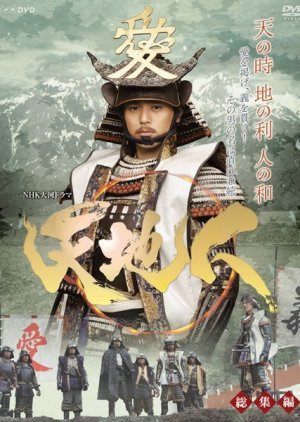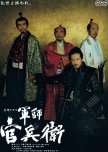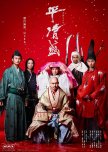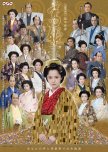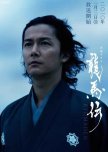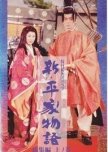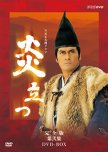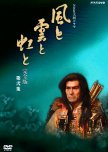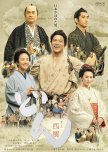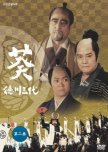
I am actually surprised at myself for not picking a taiga drama before even if I am a hardcore fan of history; I watched historical films but never a taiga drama. I think I was scared away by the length considering my low patience level but after starting this drama, that factor didn’t matter anymore.
Before I review this drama, let me first explain what taiga dramas mean. They’re Japanese yearlong historical dramas produced by NHK and each taiga takes a specific historical character to tell his life with 98% of accuracy. Unlike most of Korean Sageuk that tend to take a little part of history and built a completely inexistent story on it, taiga dramas tend to tell the history in the most believable accurate way ever. Of course there are some dramatic effects but they never sabotage history or add imaginary characters on their own. And don’t worry, they tend to explain everything whether at the beginning or in their “Travelogue” at the end so you won’t feel lost at all even if you’re not familiar with history.
Tenchijin is set during the late 16th century: The warring era which marks the most chaotic period in Japanese history where all the daimyo (clans’ lords) were fighting for the rule and power. That era happens to be my favorite fraction of the Japanese history because many of my favorite generals belong to that period. And while I previously know every single thing about the era and the destiny of its characters including my favorite names, it still felt so fresh and amazing to watch the characters I read about being alive.
During the chaotic era of schemes, betrayals and greedy intentions, NHK decided to pick the Uesgi and center their 48th taiga drama on them. For anyone who knows history, the Uesgi aren’t actually the type who ruled Japan or searched for personal gain. They have a mystical aura around them ever since the lord Kenshin’s days. It’s all about the justice for the Uesgi and Kagekatsu (Kenshin’s adopted son) followed his lord’s path of justice by the great help of this drama’s main character Kanegatsu. This storytelling is about the calm, patient, non-greedy, loyal and righteous vassal who lived his life serving the Uesgi, caring for the commoners and creating a distinguished name for himself. Kanegatsu may not have been famous like many generals of the warring era who gained popularity even in current days but he was respected and acknowledged by most of them for his thoughtful thinking and great techniques. He may not have been a great warlord but he was one of the best strategists of the era and one of the fewest who genuinely cared for farmers and the poor.
While telling the story of Kanegatsu, this drama had to center the light on many other characters and events of the era like the ever popular generals: Kenshin, Oda Nobunaga, Saru Hideyoshi, Ishida Mitsunari, Tokugawa Leyasu, Sanada Yukimora, Date Masamune, Maeda Toshie, etc. Those plot changes were quite alluring because they introduced the important figures of the era, their interactions with Kanetsugu and their thoughts about the country’s future. The main character’s meeting with those famous generals added a different taste to this drama. While some of them were his allies, others were his enemies. Considering Kanetsugu’s sense of justice and great talkative manner, you will be looking forward to how he will reply to their compliments or repay their harsh comments.
There are a lot of political clashes in this drama between daimyo lords, the rulers, the vassals and even the wives. However, this drama isn’t all about politics. It contains amazing friendship moments, some romance, heartwarming relationships and great bromance. It will always manage to keep you interested.
It’s a given that you cannot produce a great taiga drama or any historical telling without great actors who know how to make characters feel alive and this drama’s casting nailed it in that part. Tsumabuki Satoshi being the male lead for this drama was one of the main reasons why I chose it as my first taiga and no, it’s not because of fangirling reasons. That man is one of the best Japanese actors nowadays and what’s better than a taiga main role to make him even a better actor? He delivered so well, whether in the foolish, serious or heartwarming moments because that’s what his intensity is all about. What also made the acting department even more overwhelming is the presence of other astounding actors such as Abe Hiroshi, Oguri Shun, Matsuda Ryohei, Kitamura Kazuki, the veteran Utsui Ken and many others that made great scenes and awesome portrayals of the generals. There were some astonishing duets with Satoshi in many scenes.
In a line, I will mention that some battles weren’t portrayed in a good way but the cinematography and the soundtracks were quite fitting for the theme.
Watch this if:
-You love history and want to know more about the Japanese warring era.
-If you like accuracy because taiga dramas have the most informative plots ever.
-If you want to discover taiga dramas but beware that they’re nothing like sageuk.
-If you like the set of cast especially Satoshi because he was amazing in this.
Do not watch if:
-You dislike anything historical.
-You’re not a fan of the Japanese warring era.
-You dislike any of the cast.
Tenchijin is a wonderful ride through the warring period which marks the most interesting part of the Japanese history. The drama takes the life of Kanetsugu as a reference to the Uesgi clan to tell his struggles and deeds through the chaotic era to reach the peace era.
Cet avis était-il utile?

